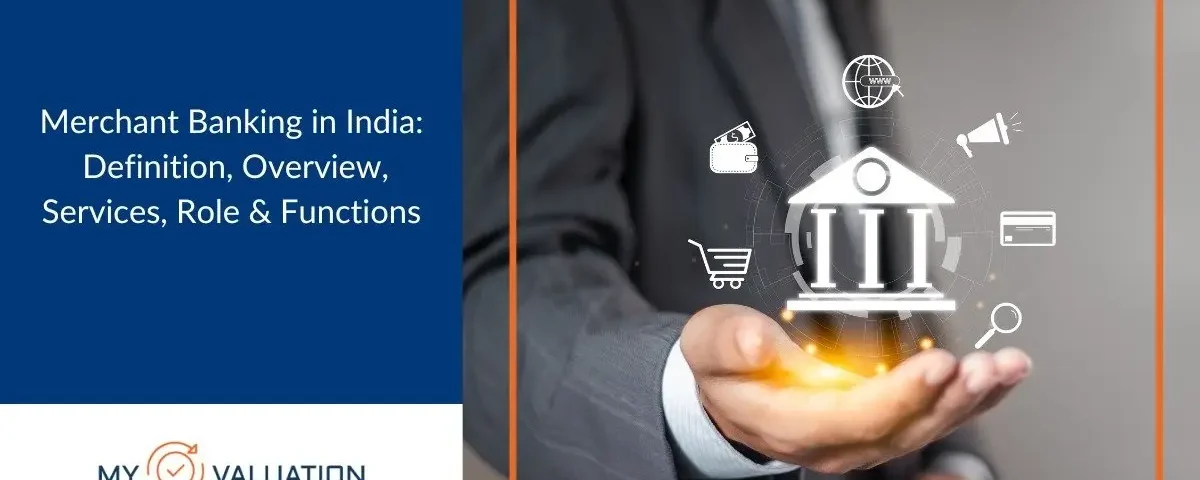Merchant Banking in India: Definition, Overview, Services, Role & Functions
You’re going to the bank and asking for a loan, aiming to buy your own house with the loan money, then you will reach a commercial bank that works for general people. Now assume again you’re going to a bank for the money you need in your business to invest and need capital to run your business then you will reach a Merchant Bank which works for the sole purpose of helping people in their business.
However, merchant banking services do not only include fundraising or capital funding services but also a vast range of services across industries and businesses. Let’s find out via this blog with thorough details of merchant banking in India, its overview, role, functions, and services:
Introduction of Merchant Banking
Merchant Banking is a set of financial, managerial, and advisory services given to small, medium, and large businesses, multinational companies, and high-net-worth individuals and families. Merchant banking services are served to businesses and paid by the high fees.
Merchant Banking is a business service provided to clients or customers as per their financial needs with financial assistance, financial planning, and financial advisory. Generally, merchant banks are a helping hand for businesses and investors to give the best advice related to investment, underwriting, fundraising, asset and wealth management, etc.
Overview of Merchant Banking in India
Merchant Banking in India and merchant banking services are regulated by the Securities Exchange Board of India (Merchant Bankers’) Regulation Act of 1992. Many private and public merchant banks in India provide financial advisory services, counseling, fundraising, etc.
To work as a merchant banker in India whether a person wants to do it or the organization, as per SEBI (Merchant Bankers’) Regulation Act, 1992, the organization or person needs to register as a merchant banker in SEBI and have to get a certificate of registration as SEBI verified Merchant Banker and renew it every three years with paying registration fees and renew fees.
Still, the certificate is necessary for only those organizations and persons who want to provide issue management assignments as managers, consultants, advisors, underwriters, or portfolio managers. SEBI has categorized registration as per the services of merchant bankers.
With updated public guidelines issued by SEBI in 1993, Currently, there are more than 200 merchant bankers registered on SEBI’s official website.
Merchant Banking Services in India
Merchant Banking Services can be simplified into four types of merchant banking services in India as [er written in the following:
1. Advisory and Consulting Service
Merchant Bankers give one of the key services as an advisor and consultant on various issues related to business. Businesses and investors connect with merchant bankers for advisory purposes regarding where they should invest, fund, or deal for the growth of their income or profit.
2. Financial Service
Merchant Bankers also provide financial assistance to businesses and high-net-worth individuals as a service. In financial services, there are services of capital raising, investment, and overall financial planning of the clients.
3. Underwriting and Issue Service
Underwriting and Issue services are one of the priority services given by Merchant Bankers where they analyze accurately on investment, financial decisions, and portfolio risk by underwriting. Issues of securities are also covered as a service for usefulness to the organization’s growth in the business.
4. Management service
Merchant Bankers serve as managers by managing client’s wealth, assets, portfolios, etc. The management service of merchant banking is a type of service where they do management and maintenance on behalf of businesses and business people to give the best results.
Role of Merchant Banking
The role of merchant bankers contains commitment, accuracy, and perfection in services provided to businesses and business personalities because merchant banking services widely affect the whole result at the end of the financial year.
The role of Merchant Banking in India is sometimes synchronized with investment banks which is not true in any terms and the role of merchant bankers in India keeps changing as per time and situations of the business.
Still, if you have involved an organization or an individual by giving the responsibility of selling, buying, or newly issuing the securities on behalf of your company and making them responsible for securities issue management as a manager, consultant, advisor, etc then the organization or individual will be defined as a merchant banker.
-
- Merchant Bankers play a pivotal role as issue managers by issuing buy and sell of the securities or issuing new securities on behalf of the company. In this way, they can be described as stock brokers.
- Merchant Bankers are risk takers or types of underwriters who convince investors to invest in the client companies.
- Merchant Bankers also improve the brand image of client companies by doing various types of promotions.
- Merchant Banker’s one of the roles is to work as managers for the complete maintenance of wealth, assets, and other projects.
- Merchant bankers provide a wide range of financial solutions and play a sole role in the structure and management of finance.
- Merchant bankers are also rolled up as legal guides for the company and always check on the company to do business with necessary certificates, registrations, and licenses.
- Merchant Bankers become tax consultants for clients when required to pay various types of government taxes.
- Even further merchant bankers affect the dividend rates of the client companies for assurance of a stable and growth financial future.
- By keen eyeing the finance of a company, merchant bankers can be described as cost cutters for clients which saves companies from overcosting and over budgeting on any financial decision.
- Merchant Bankers also help clients get foreign direct investment(FDI) by accurately convincing and managing foreign investors for foreign money investments.
- Merchant Bankers are one of the important roles that can be found in mergers and acquisitions of organizations where they utilize their resources and connections for successful mergers and acquisitions.
In this way, the Responsibility of Merchant Bankers is how perfectly they can play their role to strengthen organizations’ business, decisions, strategies, and day-to-day operations.
Functions of Merchant Banking
As directed and regulated by the SEBI (Merchant Bankers’) Regulation Act, 1992, functions of merchant banking in India can be categorized into the following:
1. Asset Management
Merchant bankers can be an organization or an individual who issues securities for buying, selling, and subscribing on behalf of the company.
2. Wealth Management
Wealth management is another function decided to be managed by merchant banks to facilitate the utmost benefits to the client.
3. Portfolio Managemen
Portfolio management is a key functionality with which merchant bankers advise, help to decide, and analyze investment markets. Therefore merchant bankers are advancing the businesses and investors by effective portfolio management.
4. Issue Management
Merchant Bankers also help issuers to issue shares, debentures, and other securities by researching market trends, expertise advisory, and risk factors of decisions.
5. Capital Raising
Merchant Bankers raise capital on behalf of their clients using their connections, business relations, and smart representation of clients’ business.
6. Mergers and Acquisitions
One of the most influential functions of merchant bankers is mergers and acquisitions by which businesses get help from big companies in terms of finance, management, and industry experience. Merchant Banking firms connect two businesses and give opportunities to small and medium enterprises to grow rapidly.
7. Venture Capital Finance
Helping to get venture capital finance to the economically sick businesses is merchant bankers’ important function allowing the businesses to do only business and get them free from worrying about finance.
8. Underwriting for Risk buys
Merchant bankers offer underwriting services for any risky buys so that organizations make buying decisions carefully.
9. Syndicating Loans
The Loan Syndication service of merchant bankers sets up all the arrangements for getting the loan from the financial institute by providing them with a result-driven analysis of their client.
10. Promotional Activities
Merchant bankers often do promotional activities to advertise the organizations and help them to make them a brand.
11. Leasing Activities
The leasing activity of merchant bankers helps businesses to get rental income by giving their assets on lease.
12. Corporate Advisory
Working as corporate advisory, merchant banks are called experts for giving complete guidance, advice, and suggestions to the business so that they can work in the realm of corporate norms and business.
Conclusion
Merchant Banking services in India are expanding with the growth of the economy. Merchant bankers can thus be defined as true partners of any business that wants to grow swiftly and improve the business without worrying about future risks, past failures, and present challenges. Therefore, it will be crucial for BIG businesses to connect with merchant bankers and decide the way forward for the business.
At My Valuation, Our team of experts provides valuation services to businesses like yours such as business valuation, startup valuation, ESOP valuation, virtual CFO services, and more. Connect with us now and you will reach the foremost Valuation Services firm, My Valuation.
Frequently Asked Questions
Who are merchant bankers?Merchant bankers can be an organization or an individual who issues securities for buying, selling, and subscribing on behalf of the company.What do merchant bankers do?Merchant Bankers work as advisors, managers, consultants, and underwriters for companies and provide merchant banking services such as issue management, financial advisory, underwriting, mergers and acquisitions, etc.What is the role of a merchant banker in a company?A Merchant Banker plays various roles for a company such as issuer, portfolio manager, advisor, underwriter, etc.
What’s the difference between investment bankers and merchant bankers?Investment bankers provide financial advisory services to big companies and large corporations and issue sales of securities and IPOs for them whereas merchant bankers provide financial advisory services to small businesses that have the potential to grow.
How to choose a merchant banker for my business?You can choose a merchant banker for your business by checking through the merchant banker’s research ability, services list, connection reach, industrial experience, etc.




